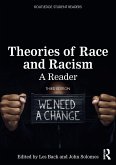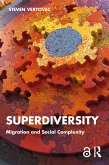Racism has a long history and its devastating impacts continue to spark heated, moral and political debate and give rise to social movements and widespread protest. This accessible primer provides a cogent introduction to the study and confrontation of racism in the twenty-first century, making use of key insights from sociology and other social sciences.
Drawing on a range of scholars, including from the radical black tradition and the Global South, this book explores key issues in racism studies. Putting racism into historical context, Moran explains the modernity of racism and its creation through European colonialism and imperialism, racial capitalism, and the development of racist hierarchies stimulated by colonialist exploitation as well as pseudoscientific and Enlightenment thinking centred upon white supremacy. Moran also discusses the intersectional, structural, institutional and systemic nature of racism, and the connections between race, racism and nationalism evident in the explosion of right-wing nationalist populism around the world. The book also investigates how the self and subjectivity are involved in racism and contribute to the reproduction of racism as a system, before considering whether there are new, cultural forms of racism, and how we can account for Islamophobia and other racisms described as new, such as colour-blind racism, post-racial racism and racism without racists. Crucially, the book explores anti-racist social movements (such as Black Lives Matter) and how racism has been challenged, and discusses how accounts of race and racism can be given without reproducing the category of race as a 'natural' organiser of people, groups, and identities.
This book will appeal to the general reader and students in the humanities and social sciences with an interest in the continuing impact of racism, racial identities, migration, multiculturalism, ethnic and racial studies, nationalism and identity studies.
Drawing on a range of scholars, including from the radical black tradition and the Global South, this book explores key issues in racism studies. Putting racism into historical context, Moran explains the modernity of racism and its creation through European colonialism and imperialism, racial capitalism, and the development of racist hierarchies stimulated by colonialist exploitation as well as pseudoscientific and Enlightenment thinking centred upon white supremacy. Moran also discusses the intersectional, structural, institutional and systemic nature of racism, and the connections between race, racism and nationalism evident in the explosion of right-wing nationalist populism around the world. The book also investigates how the self and subjectivity are involved in racism and contribute to the reproduction of racism as a system, before considering whether there are new, cultural forms of racism, and how we can account for Islamophobia and other racisms described as new, such as colour-blind racism, post-racial racism and racism without racists. Crucially, the book explores anti-racist social movements (such as Black Lives Matter) and how racism has been challenged, and discusses how accounts of race and racism can be given without reproducing the category of race as a 'natural' organiser of people, groups, and identities.
This book will appeal to the general reader and students in the humanities and social sciences with an interest in the continuing impact of racism, racial identities, migration, multiculturalism, ethnic and racial studies, nationalism and identity studies.








